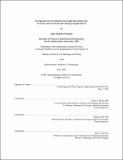Prospects for increased low-grade bio-fuels use in home and commercial heating applications
Author(s)
Pendray, John Robert
DownloadFull printable version (1009.Kb)
Other Contributors
Massachusetts Institute of Technology. Technology and Policy Program.
Advisor
Ernest J. Moniz and Daniel Cohn.
Terms of use
Metadata
Show full item recordAbstract
Though we must eventually find viable alternatives for fossil fuels in large segments of the energy market, there are economically attractive fossil fuel alternatives today for niche markets. The easiest fossil fuels to replace are those with the highest cost and that provide the lowest-grade energy. Stationary heating with oil is one example of low quality use of a high quality fuel. Solid biomass fuels such as wood-pellets, switchgrass-pellets, and corn can displace up to 2% of the U.S. petroleum market through displacing oil used in home and commercial heating. Current technologies are inexpensive enough to enable consumers to save money by heating with solid bio-fuels instead of oil. Although these systems are currently difficult to operate, future systems can increase usability and potentially further reduce costs. Key developments for future adoption are fuel handling and ash cleaning automation as well as emissions reductions. These technologies exist in other industries, such as agriculture, but have not yet been integrated into U.S. solid bio-fuel heating systems. Solid bio-fuel heating is more effective at reducing environmental damage and increasing energy security than corn-ethanol. Net CO2 emissions from solid bio-fuel heating are 75% lower than oil heating, in contrast to the nearly equivalent CO2 emissions between corn-ethanol and gasoline. (cont.) The total solid bio-fuel system evaluated included fuel feedstock cultivation, harvesting, processing, and processed fuel distribution. Solid bio-fuel heating also enables cellulosic feedstocks use today. Solid bio-fuel heating also displaces twice the oil of corn-ethanol for the same amount of corn consumed, displacing 7 to 11 times the petroleum consumed during solid bio-fuel production and distribution. Solid bio-fuels are also less likely to negatively impact the food supply, because heating oil demand matches biomass fuel supply more closely than transportation fuel demand. This decreases the likelihood of price shocks in the food supply. This paper does not advocate using food for fuel, but does show that burning corn for heat is a more energy and cost effective use for the limited food supply than corn-ethanol. Low grade biomass fuels provide the ecological benefits of alternative fuels while economically benefiting consumers. Solid bio-fuel heating is economically competitive with heating oil, utilizes existing infrastructures and technologies, and provides measurable reductions in oil consumption and greenhouse gas emissions.
Description
Thesis (S.M.)--Massachusetts Institute of Technology, Engineering Systems Division, Technology and Policy Program, 2007. This electronic version was submitted by the student author. The certified thesis is available in the Institute Archives and Special Collections. Includes bibliographical references (p. 108-111).
Date issued
2007Department
Massachusetts Institute of Technology. Engineering Systems Division; Technology and Policy ProgramPublisher
Massachusetts Institute of Technology
Keywords
Technology and Policy Program.